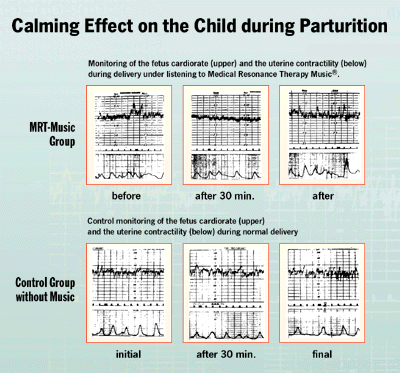Medical Resonance Therapy Music® Group
With beginning of the first phase of Labor 11 women listened to relaxing Medical Resonance Therapy Music®. Fetal heart activity was measured three times for about 10 minutes each: shortly before treating with the music, in the middle of the one hour treatment and shortly after the treatment.
Significant changes were only
recorded in this group:
acceleration and deceleration of fetal heart beat reduced – the fetus was calmed.
Control Group A with Mozart’s Music
Here 5 women listened to Mozart’s Symphony No. 28 and Coronation Mass at the beginning of the first phase of Labor Fetal heart activity was measured three times for about 10 minutes each: shortly before treating with the music, in the middle of the one hour treatment and shortly after the treatment.
No significant changes of fetal heart activity could be recorded.
Control Group B without Music
In this group 5 women were measured without any music treatment and no significant changes of fetal heart activity could be found.
Commentrecorded in this group:
acceleration and deceleration of fetal heart beat reduced – the fetus was calmed.
Control Group A with Mozart’s Music
Here 5 women listened to Mozart’s Symphony No. 28 and Coronation Mass at the beginning of the first phase of Labor Fetal heart activity was measured three times for about 10 minutes each: shortly before treating with the music, in the middle of the one hour treatment and shortly after the treatment.
No significant changes of fetal heart activity could be recorded.
Control Group B without Music
In this group 5 women were measured without any music treatment and no significant changes of fetal heart activity could be found.
The calming of fetal heart activity during Labor is a labor-specific and positive sign of Medical Resonance Therapy Music® and no sign of hypoxia, which – next to other indicators – was shown by the births of completely healthy children.
Investigators:
Prof. Dr. med. A. Reznikov
Prof. Dr. med. S. Leush
Dr. med. V. Reznikov
